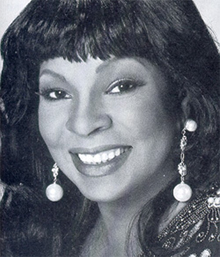Martha Reeves: Hatred is a disease that causes death of spirits, souls and dreams
CBS News asked noted figures in the arts, business and politics about their experience in today's civil rights movement, or about figures who inspired them in their activism.
Martha Reeves, singer (Martha Reeves and the Vandellas)
Is there something that you'd like to share about your personal connection to civil rights issues?
Born in Eufaula, Ala., and raised in Detroit, Mich., we spent our summer vacations in the South until our grandparents' demise, and experienced bigotry, prejudice and segregation first-hand. We knew both sides and recognized the difference between Northern and Southern living. I learned how to adjust, knowing hatred is taught, a disease contagious that causes death of spirits, souls and dreams.
As a recording artist, a message of the good news of love, I knew that our lyrics, supervised and screened by William Stevenson, William Smokey Robinson, and Motown Founder Berry Gordy and staff, were instruments of joy, personal feelings of grace and mercy, and a compassion that was shared all over the universe.
The ability to simply say "I Love You" with song and dance gave us the key to the world, and we traveled free to heal, enlighten, and understand one another's reasoning and comprehension.
Living long enough to appreciate electricity versus oil lamps, running water versus wells and water pumps, inside toilets versus out-houses, public school education, equal hospitalization, freedom to worship, I am grateful and thankful.
Please share a civil rights figure who influenced you personally.
There was never an occasion that afforded me the privilege of being in the presence of Dr. Martin Luther King, but just knowing first-hand the impact that he had on the world presenting, without a doubt, a plea for human dignity and equal rights gave me pride.
His masterpiece speech -- or should I say Sermon -- was a recording in Detroit by Berry Gordy of Motown Records, letting the world know that he was not afraid to carry out God's plan for his children. He gave every human being a reason to consider living together, unified, peaceful, and in harmony in this world that God created for us all.
"Free at last, free at last, Thank God almighty, we are free at last."
I realized that the United States had achieved the state of mind needed to win the battle of differences, and can share the world under God, one nation, indivisible.
We as a people had been promised constitutional citizenship rights in 1787 in the 13th through 15th Amendments. It was voided by the Supreme Court in 1833 [which held that the Bill of Rights could only apply to the federal governments, not the states].
In 1900, 18 states of the North and West had attempted to make a difference, but segregation was still legitimized. The year of my birth, 1941, [saw] legislative wars for outlawing discrimination in defense industries. After the war, the NAACP's lawyers fought all the way to the Supreme Court to desegregate the armed forces (1948), declaring segregation detrimental to blacks and unequal in public schools and facilities.
Then we applauded Brown v. Board of Education of Topeka, Kan., May 17, 1954, proving segregation unconstitutional. Rosa Parks made a stand that had been attempted by other suppressed Southerners and succeeded in getting the attention in Montgomery, Ala., just before Christmas in 1955. A one-day boycott in protest, the loss of revenue to the bus system, and a historic movement by Black churches brought Dr. Martin Luther King (who led the Southern Christian Leadership Conference) in 1957 to force desegregation. Picketing, marching and boycotting spread during 1955 and 1960. Progress was made, but in the Deep South, the Ku Klux Klan remained stiff-necked and adamant.
Dr. King preached non-violence through organizations such as the Student Nonviolent Coordinating Committee (SNCC), launched in 1960. The Congress of Racial Equality (CORE) and the "Freedom Riders" continued the movement, prompting civil rights legislation in Congress. The Federal government under Presidents Dwight D. Eisenhower and John F. Kennedy were crusaders, Kennedy even being assassinated before Congress finally acknowledged the legislation, and in 1964 Lyndon B. Johnson signed the Civil Rights Act.
Martin Luther King, who preached non-violence, was assassinated in April 1968.
We succeeded in making like-minded people, and faith in religion showed the true spirit of love for one another -- one nation, under God, indivisible, with liberty and Justice for all is surely becoming reality. Laws introduced by Moses, exercised by David, and proved by Jesus Christ the son of the Living God are being practiced.
For more info:
- missmarthareeves.com
- Follow Martha Reeves on Twitter (@MARTHAREEVESvan) and Facebook
